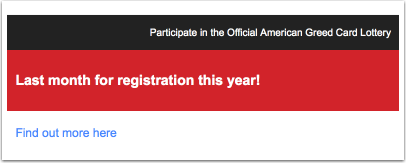Silly Spam
I was cleaning out my inbox over the weekend and found a spam that actually made me laugh.
Yes, it is spam advertising the “Official Greed[sic] Card Lottery.” It’s been 20 years since I’ve seen one of those!
Live, work and study in the USA
The American Dream Within Reach
50,000 people and their families will get a green card
Simple registration within 5 minutes
Yeah, we’ll get right on that!

